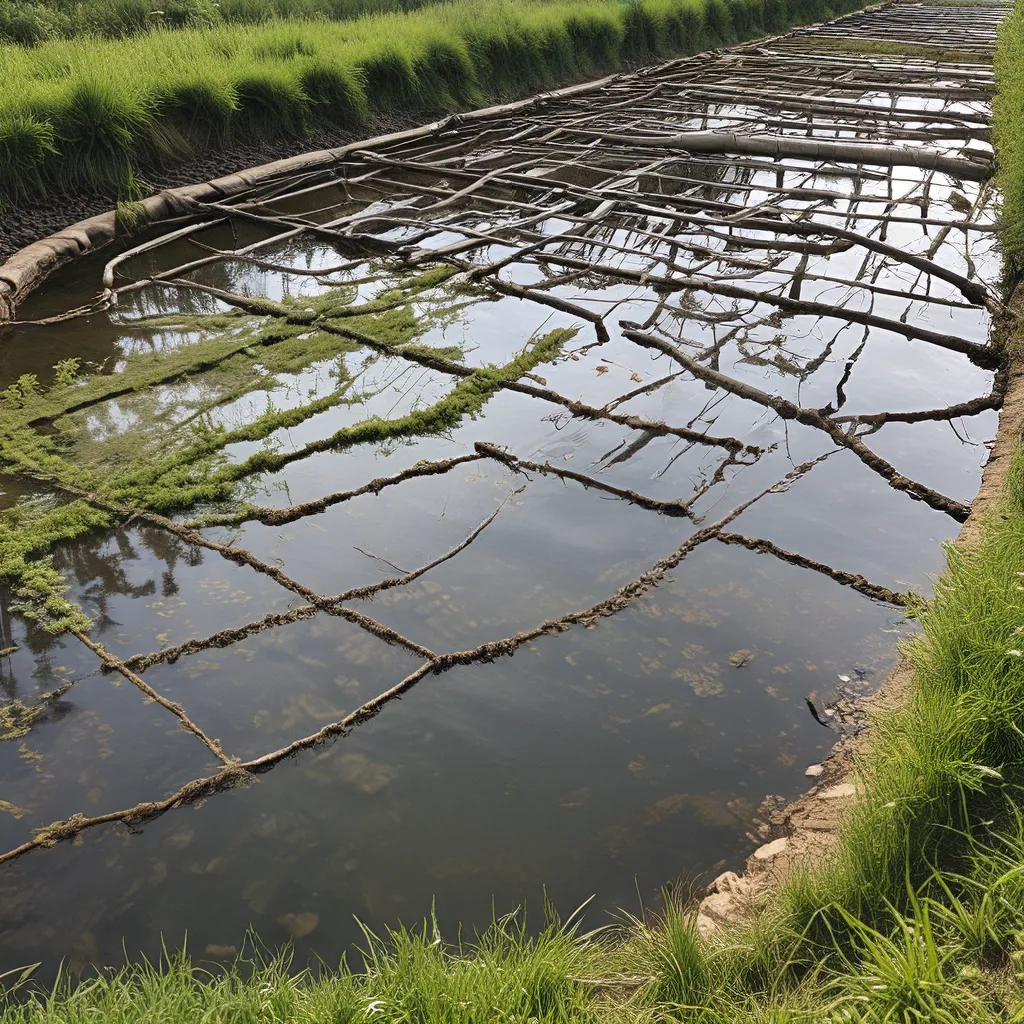
As a sustainability enthusiast, I’ve always been fascinated by the intricate relationship between human activities and the natural world. It’s a delicate balance that we must navigate with care, and nowhere is this more evident than in the realm of wastewater treatment.
The Challenges of Traditional Wastewater Treatment
Traditional wastewater treatment systems have long relied on energy-intensive, chemical-based processes to remove contaminants and purify water. While these methods have been effective in meeting basic water quality standards, they often overlook the broader environmental impact. The energy-guzzling machinery, the release of chemical byproducts, and the disruption of natural water cycles can have far-reaching consequences for the surrounding ecosystems.
In recent years, however, a growing movement towards nature-based solutions has emerged as a promising alternative. These innovative approaches aim to harness the power of natural systems to treat wastewater in a more sustainable and ecologically-friendly manner. By integrating natural processes like wetlands, biofiltration, and constructed ecosystems, we can create closed-loop systems that mimic the self-regulating mechanisms of nature.
Wetlands: Nature’s Wastewater Treatment Facilities
One of the most well-known nature-based solutions is the use of wetlands for wastewater treatment. These dynamic ecosystems, with their intricate web of plants, microorganisms, and soil, possess a remarkable ability to filter, transform, and store a wide range of contaminants.
Wetlands can effectively remove nutrients, heavy metals, and organic compounds from wastewater, while also providing valuable habitat for wildlife and contributing to the overall health of the local environment. By strategically constructing or restoring wetlands, we can create nature-based treatment systems that are not only highly efficient but also visually appealing and ecologically beneficial.
Biofiltration: Harnessing the Power of Nature’s Microbial Allies
Another innovative approach to wastewater treatment is biofiltration, which capitalizes on the incredible capabilities of microorganisms. By cultivating specialized microbial communities within engineered filtration systems, we can harness their natural ability to break down and remove a wide range of pollutants, including pharmaceuticals, pesticides, and industrial chemicals.
Biofiltration systems can be designed to mimic natural processes, such as the self-cleaning mechanisms found in soil and groundwater ecosystems. These nature-inspired technologies not only reduce the reliance on energy-intensive and chemical-heavy treatment methods but also create opportunities for resource recovery, such as the production of biofuels or the extraction of valuable nutrients.
Constructed Ecosystems: Closing the Loop
While wetlands and biofiltration offer powerful nature-based solutions, the integration of these approaches can be taken even further through the development of constructed ecosystems. These engineered environments are designed to replicate the complex interactions and feedback loops found in natural ecosystems, creating closed-loop systems that treat wastewater while also generating valuable byproducts.
Constructed wetlands, algae-based systems, and aquaponic farms are just a few examples of these nature-inspired solutions. By incorporating multiple natural processes, such as plant uptake, microbial decomposition, and nutrient cycling, these systems can not only treat wastewater but also produce biofuels, fertilizers, and even food – all while maintaining a delicate balance with the surrounding environment.
Integrating Nature-Based Solutions into Wastewater Treatment
Embracing nature-based solutions for wastewater treatment is not just about adopting new technologies; it’s about fundamentally rethinking our approach to water management. Alpha Wastewater, a leading provider of innovative wastewater treatment services, is at the forefront of this paradigm shift, combining cutting-edge engineering with a deep understanding of ecological principles.
By collaborating with local communities, environmental organizations, and regulatory bodies, Alpha Wastewater is pioneering the integration of nature-based solutions into comprehensive wastewater management strategies. This holistic approach not only improves water quality but also enhances the overall health and resilience of the surrounding ecosystems.
Overcoming Challenges and Embracing the Future
Of course, the transition to nature-based wastewater treatment is not without its challenges. Concerns about scalability, performance consistency, and regulatory compliance are just a few of the hurdles that must be navigated. However, as the field of ecological engineering continues to evolve, and as our understanding of natural systems deepens, these challenges are being addressed with increasing success.
Ongoing research and pilot projects are exploring new frontiers, like the use of artificial wetlands to treat industrial effluents or the integration of phytoremediation (plant-based pollution removal) into urban stormwater management. These promising developments suggest that the future of wastewater treatment lies in a harmonious blend of human ingenuity and the power of nature.
As I reflect on this journey, I’m reminded of the wisdom of Albert Einstein, who once said, “Look deep into nature, and then you will understand everything better.” By embracing nature-based solutions for wastewater treatment, we’re not just solving a practical problem – we’re also learning to work in concert with the natural world, forging a more sustainable and resilient future for all.
So, the next time you flush the toilet or turn on the tap, I encourage you to think about the incredible journey your wastewater takes, and the incredible potential of nature to help us manage it in a way that benefits both people and the planet. It’s a fascinating, ever-evolving story, and one that I’m excited to be a part of.